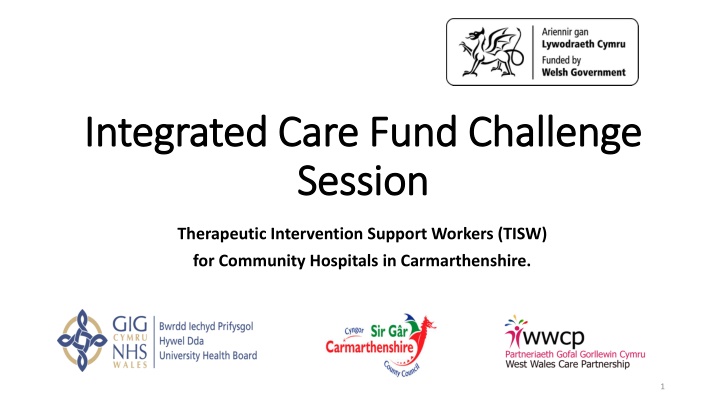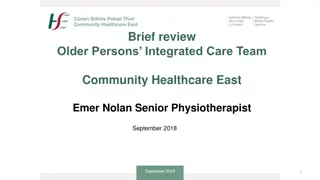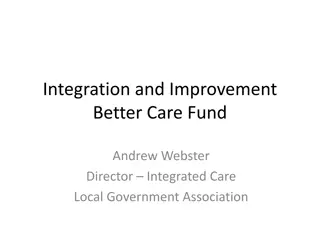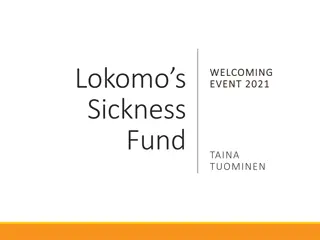Integrated Care Fund Challenge in Carmarthenshire
This project focuses on enhancing outcomes for individuals and organizational performance in community hospitals. By introducing Therapeutic Intervention Support Workers, the initiative aims to reduce length of stay, improve patient flow, and decrease reliance on commissioned social and health care services. The project integrates with ICF objectives and emphasizes prevention through efficient care provision for frail older adults.
Download Presentation

Please find below an Image/Link to download the presentation.
The content on the website is provided AS IS for your information and personal use only. It may not be sold, licensed, or shared on other websites without obtaining consent from the author.If you encounter any issues during the download, it is possible that the publisher has removed the file from their server.
You are allowed to download the files provided on this website for personal or commercial use, subject to the condition that they are used lawfully. All files are the property of their respective owners.
The content on the website is provided AS IS for your information and personal use only. It may not be sold, licensed, or shared on other websites without obtaining consent from the author.
E N D
Presentation Transcript
Integrated Care Fund Challenge Integrated Care Fund Challenge Session Session Therapeutic Intervention Support Workers (TISW) for Community Hospitals in Carmarthenshire. 1
Project Introduction Project Introduction These posts have improved outcomes for individuals and improved performance at organisational level in terms of reduced length of stay, improved patient flow and reduced demand and dependency on commissioned social and health care. This supernumerary initiative has enhanced current resources to provide timely and efficient review of frail older adults to ensure the care provision meets their needs whilst maximising their opportunity for independence. In conjunction, this approach has crossover and aligns with the approach adopted in IMTP & Transforming Clinical Services. Staff structure 2 band 3 HCSW for Llandovery Cottage Hospital - (Commenced May 2017) 2 band 3 HCSW for Amman Valley Hospital. (Commenced April & Aug 2017) 2
Funding arrangements Funding arrangements Funding arrangements: Budget: 81,967.00 Funding from ICF: 81,967.00 Any other funding: N/A Spend 2018/19 (incl spend to date): 73,776.70 Projected 2019/20 budget required: 88,532.00 3
Project tie Project tie- -in with ICF objectives in with ICF objectives Integration - These posts will ensure improved outcomes at individual level but will also contribute to improved performance at organisational level in terms of reduced length of stay, improved patient flow and reduced demand and dependency on commissioned social and health care. Prevention - This initiative enhances current resources to provide timely and efficient review of frail older adults to ensure the care provision meets their needs while maximising their opportunity for independence. 4
Project key achievements Project key achievements Reduced Length of Stay. Decreased requirement for commissioned care. (requested data from Silvana to demonstrate). Positive patient and relative feedback. Individuals supported to achieve maximum independence for longer in the community. Use of Clinical Frailty Scale to measure scores on admission and on discharge to measure patient outcomes. Of the 210 patients this year 68 Clinical Frailty Scale Scores Improved upon discharge (a metric only measured this year) 5
Improvements seen in the Community Hospitals Improvements seen in the Community Hospitals No requests for CHC Packages of Care in the patients own home from Llandovery or Amman Valley since the Therapeutic Intervention Support workers have been in post Introduced milk shake rounds to support nutrition and hydration delivered by the Therapeutic Intervention Support Workers Quote from Sr Catrin Jones from Amman Valley - The TISWs work along side the Physiotherapist, Occupational Therapists and ward staff. They gather information from every patient and make an assessment, feeding back findings to the multi disciplinary teams. Attending the ward MDT meetings and are key members providing crucial information when discussing patients. Some of their role is to work with allocated patients with their rehab goals which are set on assessment and documented, washing and dressing assessments with support from Occupational Therapists and providing exercise classes in the day room or bed area. I feel this is a crucial role and it has improved patient rehabilitation greatly. - I hope to extend their roles and responsibility over the foreseeable future. Quote from patient - Mr F stated to the TISW team Thank you for your assistance - I am delighted to be able to go home where I belong and if I keep up my routines, there is no reason why I cannot stay home 6
Key achievements and outcomes Key achievements and outcomes The Reduced Length of Stay is as a result of the constant intervention by the support workers under the direction of the Therapists (and Community Hospital staff). This treatment is intensive and ongoing over 7 days and not only when the Therapists are in the community hospital. They are working very closely with the patients and can support the Therapist with goal setting. This in turn provides better outcomes for patients. The Therapeutic Intervention Support Workers (TISW) take education and training from the Physiotherapists and Occupational Therapists and support the patients directly to maximise daily living assessments and practical skills, to get patients ready for the transition home The number of people discharged increased in 18/19 with: Combined Hospitals Discharges in Q1 65, Q2 68 & Q3 77. With more patients going home The TISWs are aiming to address the Isolation Agenda by supporting people to feel less isolated and lonely by moving them back into the heart of the Community Reduction in LOS - The average length of stay has reduced from 15.27 days (Q1) to 14.87 days (Q2) to 12.42 (Q3) evidencing a reduction in LOS. (2017/18 data evidences: Q1 16 days; Q2 15 days & Q3 15.6 days) 7
Case study Case study Mrs M was admitted to the Community Hospital from home via the GP. On admission she was doubly incontinent and had significant pressure damage. She had been sleeping on the sofa for months due to being unable to manage stairs. She was malnourished and unable to prepare food. Mrs M was immobile and had significant pressure damage with general deterioration in health. It was felt that Mrs M had sudden functional decline and would benefit from a period of assessment and rehabilitation. The Therapeutic Intervention Support Workers supported Mrs M to become more motivated in engaging with a rehabilitation programme, ensuring that she regained the confidence to believe she would be able to return home and live independently. Accessing the upstairs area of her house and being able to go to her bed was vital for Mrs M. They encouraged her to feel more positive about having a package of care. Rehabilitation was provided over a 24 hour period, with clear direction from the Therapist. The key focus was healing pressure areas, regaining a toilet regime and therefore reducing the risk of incontinence and focusing on accessing stair and kitchen practice at the area was ongoing, all where successfully achieved. Following a successful OT home visit where Mrs M was assessed as being safe in her own kitchen and able to manage the stairs, Mrs M was discharged with a long term package of care with support from Red Cross for shopping etc and is reported to be doing very well. It was originally anticipated that Mrs M would require Long a Term Residential Care placement
Sustainability plan Sustainability plan It is anticipated that this initiative will provide the evidence required to ensure that the Therapeutic Intervention Support Worker posts are provided with long term substantive investment. The options are: Secure ongoing monies for ICF Secure Funding from IMTP Revert back to original establishment and absorb staff into available vacancies within the County. Employ greater numbers of Physio & OT s with dedicated time for Community Hospitals 9
Project development for future Project development for future Aim to continually improve Delayed Transfers of Care Better outcomes for patients including earlier discharges which can have a significant impact on frail older adults and improve long term outcomes. Therapeutic Intervention Support Workers for Community Hospitals in Carmarthenshire have made an enormous difference to the holistic care and management of patients in the hospital. Increase the TISWs - If the numbers of staff could be increased over the coming years, the difference to patients general well-being will be magnified exponentially over the next 2 years To share the knowledge and skills with the wider HCSW in the Community Hospitals Develop Dementia & Carer champions within this TISW role in Year 1 Develop more robust smart processes to implement measures to demonstrate the effectiveness of the service via the recent advent of complex discharge SharePoint in the Community Hospitals in Year 1 10
Conclusion Conclusion - - Summary & reflection Summary & reflection Ongoing meetings for planning and training of the Therapists continue to determine how the role can be developed even further going forward, to ensure that the early outcomes are maintained. The reviews completed are delivering positive outcomes for individuals, alongside striving for savings in commissioned care. The reduction in LOS is multi-factorial but without doubt the Therapeutic Intervention Support Workers contribute a great deal to returning patients to a pre-morbid state faster in the Community Hospitals, thus reducing delays and the package of care that the patients leave with. 11























